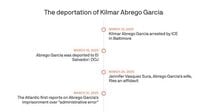A federal judge in Maryland is demanding answers from the Trump administration regarding the case of Kilmar Abrego Garcia, a Salvadoran national who was mistakenly deported to a notorious prison in El Salvador. U.S. District Judge Paula Xinis has ordered sworn testimony from government officials to determine whether they have complied with a Supreme Court ruling that mandates the facilitation of Abrego Garcia's return.
On April 15, 2025, Judge Xinis expressed her frustration with the administration's handling of the situation, stating that officials had defied a "clear" Supreme Court order. She emphasized that the Trump administration has done nothing towards aiding Abrego Garcia's release, despite being obligated to take steps to facilitate it.
Abrego Garcia, who lived in the U.S. for approximately 14 years, was deported on March 15, 2025, despite having been shielded from deportation by a U.S. immigration judge in 2019. The judge had ruled that he would likely face persecution from local gangs in El Salvador. His deportation has become a focal point in the Trump administration's broader immigration policies, which have emphasized mass deportations.
Following the judge's ruling, a crowd gathered outside the federal courthouse in Maryland, chanting, "What do we want? Due process. When do we want it? Now!" The attorney representing Abrego Garcia, Rina Ghandi, indicated that contempt proceedings could be a logical next step after the fact-finding phase. "This is still a win, and this is still progress," Ghandi stated, highlighting the importance of the legal battle.
Abrego Garcia's wife, Jennifer Vasquez Sura, expressed her anguish over her husband's situation, stating, "That dream was shattered on March 12th when he was abducted and disappeared by the United States government in front of our 5-year-old child." She emphasized her determination to continue fighting for her husband's return, stating, "I will not stop fighting until I see my husband alive."
Meanwhile, Democratic U.S. Senator Chris Van Hollen of Maryland announced plans to travel to El Salvador to check on Abrego Garcia's well-being and engage with government officials about his release. Van Hollen's visit underscores the political implications of Abrego Garcia's case, as it raises questions about immigration enforcement and the responsibilities of the U.S. government.
The Trump administration's stance has been complicated by its assertion that Abrego Garcia is a member of the MS-13 gang, which the administration has labeled a foreign terrorist organization. White House press secretary Karoline Leavitt reiterated this claim, stating, "There is never going to be a world in which this is an individual who is going to live a peaceful life in Maryland." However, Abrego Garcia's family and legal representatives dispute these allegations, arguing that he fled El Salvador as a teenager to escape gang violence.
During a meeting with President Trump, El Salvador's President Nayib Bukele rejected the notion of returning Abrego Garcia, likening it to smuggling a terrorist into the United States. Bukele's comments reflect the contentious nature of the political relationship between the two countries, particularly regarding immigration policies.
In recent court filings, the Trump administration acknowledged that Abrego Garcia's deportation was an "administrative error" but has maintained that it lacks the authority to retrieve him from El Salvador. The administration's position was further complicated by a Supreme Court ruling that mandated the government to facilitate Abrego Garcia's return.
Judge Xinis has ordered the government to provide daily updates on its efforts to return Abrego Garcia, and she has called for the testimony of four Trump administration officials from U.S. Immigration and Customs Enforcement, the Department of Homeland Security, and the State Department. This process is expected to take about two weeks.
Despite the administration's claims of a lack of authority, Abrego Garcia's lawyers argue that the U.S. is paying El Salvador approximately $6 million to house prisoners, which they believe gives the U.S. leverage to request his release. They contend that the U.S. has the power to facilitate Abrego Garcia's return, especially since he has been wrongfully deported.
The legal battle surrounding Abrego Garcia's case highlights the complexities of immigration law and the often contentious intersection between executive power and judicial oversight. As the situation develops, many are watching closely to see how the courts and the administration will navigate this challenging case.
In the meantime, Abrego Garcia remains in custody at the Terrorism Confinement Center in El Salvador, a facility known for its harsh conditions. His family continues to advocate for his return, emphasizing the emotional toll that his deportation has taken on their lives.
As the legal proceedings unfold, the implications of this case extend beyond Abrego Garcia and his family, raising broader questions about immigration policy, due process, and the treatment of individuals caught in the crosshairs of a contentious political landscape.









